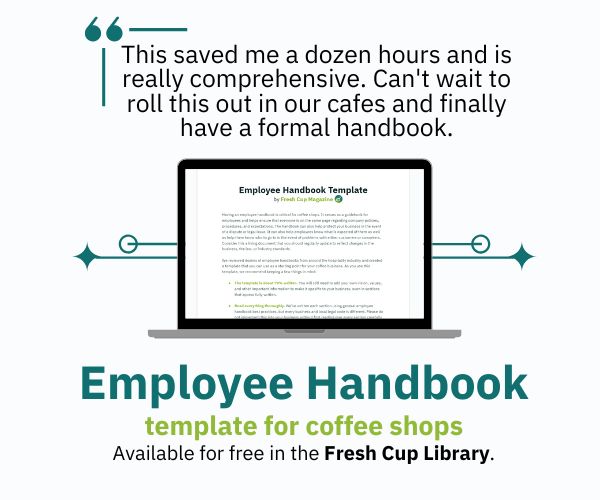Can airline coffee taste good? Stumptown and Alaska Airlines think so. Plus, La Marzocco and Mahlkönig launch a new partnership and coffee farmers in Brazil face fluctuating temperatures.
‘Alaska Airlines Has Created a Coffee That It Says Tastes Better in the Sky’ – via CNN
What’s the deal with airline coffee? Airline food is notoriously mediocre, and the coffee isn’t much better (although, despite the many articles discouraging people to stay away from airline coffee—or anything brewed with airline water—coffee on a plane is safe to drink).
Now that we know it’s not the water making your airline cup taste flat, let’s look at the actual problem: altitude. When you’re flying, the altitude, the pressurized cabin and dry, recycled air affect your sense of taste and smell. Much like food, coffee at 35,000 feet simply lacks the aromatics and complexity of flavor that it would on the ground.
To counteract coffee’s drabness in the air, most carriers have moved away from nondescript coffee and now serve brands like Dunkin or Starbucks. Some have gone for a more specialty approach, at least for first-class passengers—British Airways serves Union Coffee in some of its airport lounges, while Asiana Airlines goes a step further by brewing a Chemex in front of business and first-class passengers on select flights.
While not quite at that level, Alaska Airlines has taken a step in the specialty direction by switching its coffee supplier from Starbucks to Stumptown Coffee. The two companies have even worked together “to make a coffee that’s immune from the altitude-changing effects that airborne-served coffee typically creates, including tasting bitter and weak,” according to CNN.
A press release notes that the custom coffee blend builds on Stumptown’s Holler Mountain but “with a primary focus on a roast that mellows acidity and introduces just enough toastiness to please a wide range of palates.” The coffee underwent tests “both on the ground and in the air,” including more than 200 pots of coffee brewed during development, as well as customer surveys to find the ideal blend.
“Having flown millions of miles fueled by countless cups of coffee, Stumptown stands out as first class,” said Alaska Airlines CEO Ben Minicucci. “Like travel, coffee has a remarkable way of bringing people together. I can’t wait for our guests and employees to enjoy a cup of Stumptown when they fly with us.”
‘La Marzocco And Mahlkönig Team Up For The Sync System’ – via Sprudge
The Internet of Things has been part of the coffee equipment world for years—grinders, brewers, scales, and roasters can all connect to apps to download data and analytics. This lets coffee professionals and enthusiastic amateurs alike track their brews and roasts in order to analyze and improve them.
Now, La Marzocco and Mahlkönig have partnered to debut the all-new Sync System, which allows La Marzocco espresso machines to pair up and exchange data with Mahlkönig grinders via the two companies’ apps. The Sync System enables users to monitor machinery remotely and make grind adjustments in real time.
“At Mahlkönig and La Marzocco, we share a common goal: delivering quality coffee moments with unmatched speed and convenience around the world,” Mahlkönig said in a press release. “In collaboration we’ve taken the next step: unlocking the possibility to produce high quality espresso shots reproducible and repeatable across different employees/baristas and locations.”
Here’s an example of how the Sync System works: if an espresso machine detects a too-quick or too-slow espresso shot, it will communicate with the grinder to refine the grind setting ever so slightly. “This real-time communication,” the press release states, “ensures consistency in taste and quality, creating the perfect cup, no matter the location.” The company says the Sync System will increase efficiency and allow baristas “more time for customer interactions as they can brew faster, enhancing the overall customer experience.”
The Sync System will be featured on the Mahlkönig E80W Grind-by-Sync and one of three La Marzocco machines: the Linea PB ABR, GB5 ABR or KB90 ABR. Mahlkönig hopes to expand the system to other manufacturers, “[aiming] to evolve it into the go-to ecosystem for professional coffee preparation by facilitating data exchange with other coffee equipment and software solutions.”
More News
‘The Women-Powered Coffee Summit Returns To Costa Rica In November’ – via Sprudge
‘Ally Coffee Launches ‘Rooted in Coffee’ Podcast’ – via Daily Coffee News
‘La Marzocco Surrenders Rights to Integrated Scale Technology’ – via Global Coffee Report
‘Why Blue Bottle is Rolling Out Its First Capsule Collaboration with Nespresso’ – via Modern Retail
‘CQI and African Fine Coffees Association Plan Long-Term Collaboration’ – via Daily Coffee News
‘Dutch ‘Coffee Shops’ Savor Legal Pot Trial’ – via France 24
‘Robusta Price Remains at Near-record High: ICO Market Report’ – via Global Coffee Report
‘Regal Ware Sells French Press Brand Espro to Toronto’s DKK’ – via Daily Coffee News
The Week in Coffee Unionizing
Starbucks was on the wrong end of two more rulings this week.
A National Labor Relations Board judge ruled that former Starbucks CEO Howard Schultz illegally threatened a union supporter during a “listening tour” in 2022. At a session with workers in Long Beach, California, a barista, Madison Hall, asked Schultz about union-busting allegations. Schultz replied that he wasn’t there to discuss union issues and told Hall, “If you’re not happy at Starbucks, you can go work for another company.”
Administrative Law Judge Brian Gee said this “amounted to a warning that protected pro-union speech was not compatible with employment at Starbucks,” according to Reuters.
In a separate ruling, a federal judge told Starbucks it must provide regulators with details of its spending on responding to the union drive. The US Department of Labor issued a subpoena as part of its investigation into whether Starbucks violated financial disclosure laws during its unionization response.
Specifically, the DOL wants to see details of travel expenses when Starbucks sent Schultz and other executives to Buffalo, New York, in 2021 in the wake of the first unionization drive. Starbucks challenged the subpoena, so DOL filed a court petition to force the issue.
“We will not sit idly by when any company, including Starbucks Corp., defies our request to provide documents to make certain they are complying with the law,” said US Solicitor of Labor Seema Nanda in a statement. Starbucks commented that DOL had not accused the company of wrongdoing and would “continue to engage with government officials to provide clarifying information on our compliance with decades of labor law.”
Coffee and the Climate Crisis
“The climate is confused. There’s no logical sequence as there was. We have moments when it was supposed to be dry, and it’s raining. The opposite also happens. And the plant doesn’t know how to react. It totally breaks its logical sequence. The plant has blossom, chumbinho [early-stage fruit], ripened coffee, dried coffee, all at the same time. It’s a horror.”
This is how José Oscar Ferreira Cintra, a Brazilian farmer, describes how his coffee reacts to the changing climate. His perspective is part of a report in Mongabay that interviews producers in the world’s largest coffee-growing country on dealing with multiple climate threats, from lack of rain to fires and intense frosts.
“In recent years, we’ve had days with more extreme weather, more intense cold and more intense heat,” says Felipe Barretto Croce, a producer in Mococa, in the state of São Paulo. “We’re seeing a rain deficit in general. This is probably due to a lot of deforestation around us, in the Cerrado and the Amazon.”
Even in regions that traditionally receive more rain, farmers are finding it difficult to rely on previous years’ data. “In the last five years, the March bloom has produced less,” says Afonso Donizete Lacerda, who grows coffee at altitudes of up to 1,400 meters in Dores do Rio Preto, Espírito Santo. “January has been rainy and we think that’s what’s affecting the decrease in late flowering here.”
As climate patterns become less predictable, more farmers are looking to adaptive solutions. One option is agroforestry, which is becoming more popular in Brazil and uses shade trees and intercropping to protect the coffee plants, improve the soil, and create additional income. “I’m completely changing the way things have been managed in the past,” says Croce. “Today I’m planting with functional agroforestry in the middle of the coffee, fully mechanized, to create a comfortable, balanced and stable habitat for my coffee.”















